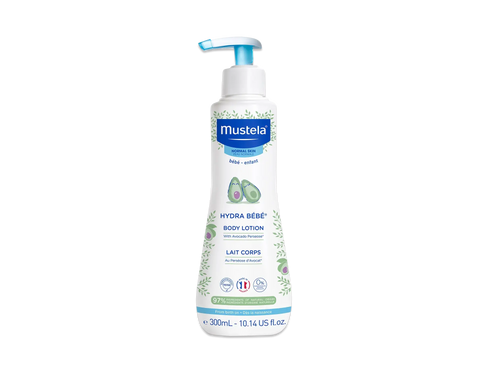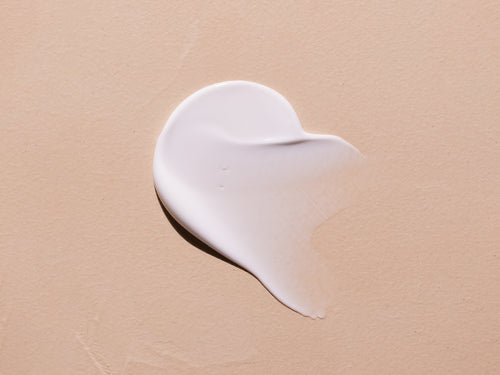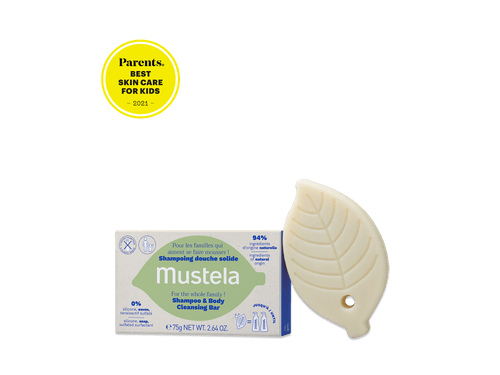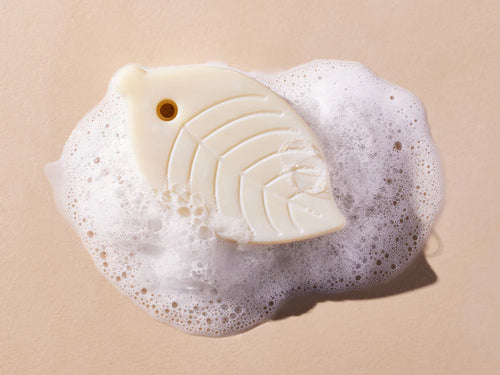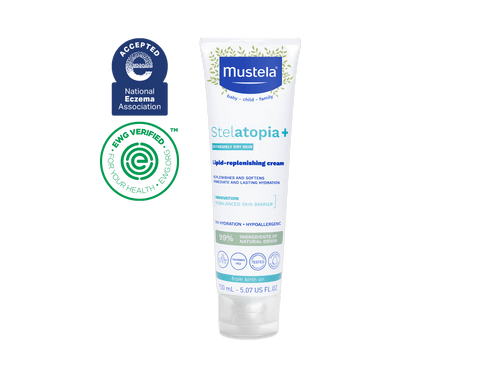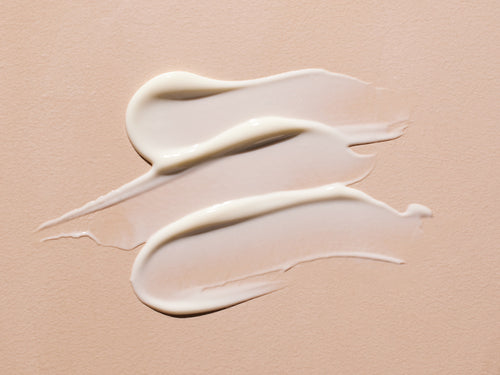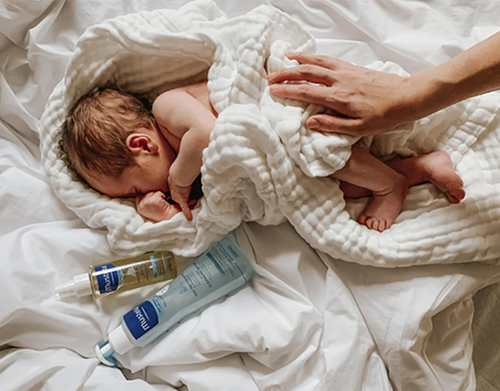Can you believe that your baby is already one month old? It probably feels like your little bundle of joy arrived yesterday. And so much has changed in the last few weeks! As such, you may have a few questions about your 1 month old baby’s development.
In this post, the baby experts at Mustela will explain everything you need to know about caring for your 1 month old baby.
We’ll cover your baby’s development, senses, motor skills, eating schedule, and sleeping habits. Then we’ll close with some general childcare tips and a few warning signs to keep an eye out for.
Caring For Your 1 Month Old Baby
In the first few weeks after birth, your baby’s life is pretty simple. It involves plenty of sleeping, eating, and, of course, dirty-diaper-making. But your little one is growing rapidly, and you probably have a few questions about their development.
Here’s everything you need to know about your 1 month old baby.

Your 1 Month Old Baby’s Development
By the time your little one reaches the one-month mark, they’ve already put on a few pounds since birth.
While most babies actually lose weight in the first week of life (due to excess water weight being shed) babies start gaining weight quickly in the second and third weeks of life. Your baby is probably gaining a half-ounce to an ounce per day.
One-month-old baby boys are typically 8.8 pounds (4 kg) to 10.8 pounds (4.9 kg) in weight. On average, boys are between 20.9 inches (53 cm) to 22 inches (56 cm) in height at four weeks.
Baby girls are a bit smaller at the one-month mark, with average weights ranging from 8.4 pounds (3.8 kg) to 10.1 pounds (4.6 kg) and average heights between 20.5 inches (52 cm) to 21.7 inches (55 cm).
It’s important to note that these are just averages. Babies, just like adults, have a wide distribution of weights and heights. There’s absolutely no reason to worry if your 1 month old baby is a little bigger or smaller than the figures we’ve stated here.
Your 1 Month Old Baby’s Senses

Sense Of Sight
At just one month old, your baby’s senses are not yet fully developed. Your little one is extremely nearsighted and can only see objects clearly when they are 12 to 14 inches away from their face. Anything further than that appears fuzzy.
Babies prefer to look at objects with bright colors, simple designs, and bold lines because they’re easier to see.
Luckily, your baby is close enough to you to study you while they’re feeding. Your little one’s gaze will naturally be drawn to your face, as they are slowly learning to recognize you.
Sense Of Smell
At the same time, research has shown that your baby can recognize the scent of your breastmilk. Your infant’s sense of smell is still developing, but your milk is one scent they know and love.
For as much as your baby may enjoy your breast milk, sometimes it’s hard for new moms to get the hang of nursing. Between struggling to find the right position and dealing with cracked or sore nipples, breastfeeding isn’t always a walk in the park.
To moisturize and protect your breasts, use a natural nipple cream, like Mustela’s Nursing Comfort Balm. This lanolin-free balm is designed to ease discomfort, moisturize, and protect your nipples.
And it’s made with 100% naturally derived ingredients so you can feel good about what you’re putting on your skin.
Sense Of Taste
Your 1 month old baby’s sense of taste is also rudimentary, as they have only ever tasted breast milk or baby formula. This sense will develop as they grow and try new foods.
Sense Of Hearing
While your 1 month old baby can hear relatively well, they have not yet learned to recognize different sounds. One that they can identify, though, is the sound of your voice.
Research has shown that babies become familiar with their mother’s voice while in the womb. That’s why your baby finds your voice so soothing.
Sense Of Touch
Lastly, your baby’s sense of touch is limited, but it’s still important to hold them often. According to some studies, your baby needs skin-to-skin contact with Mom and Dad in order for their brain to develop properly.
So hold your little one close and give them plenty of TLC!
Your 1 Month Old Baby’s Motor Skills

At this point, your little bundle of joy doesn’t have the muscle strength to move around much. Your baby has basic reflexes, like the Moro reflex and the startle reflex, as well as the ability to suckle. Your little one should also be able to flail their arms and legs a bit.
If you place a single finger in the palm of your baby’s hand, they may close their fist around it. And while your 1 month old baby doesn’t have the strength to hold up their head yet, you may notice them turning their head to the side when lying on their back.
A great way to help your baby’s muscles develop is to give them plenty of tummy time. This is essentially placing your baby on their stomach and letting them get used to lying in this position. Tummy time will strengthen your little one’s arms, shoulders, neck, and back muscles.
Your 1 Month Old Baby’s Eating Schedule

At the one-month mark, your baby needs to eat often. They’re growing quickly and surviving on only breastmilk or baby formula, so they need to feed frequently.
Ordinarily, a 1 month old baby will become hungry every two to three hours. And while your little one may sleep for up to four or five hours at a time during the night, they need to eat immediately before and after sleeping.
Many parents wonder whether their baby is getting enough nutrition. This is a valid concern, but it’s difficult to give a precise answer, as all babies are different. If you’re formula-feeding your 1 month old baby, they should have about four ounces of formula every three to four hours.
If you’re breastfeeding, there are two ways to make sure your little one is eating adequately. The first is to make sure your baby seems content at the end of every feeding. Trust your judgment on this one! No one knows your baby better than you.
The second way to ensure that your baby is consuming enough is to monitor their weight. As long as your 1 month old baby is gaining weight at a healthy rate, their feeding habits are A-OK.
Your 1 Month Old Baby’s Sleeping Habits
This probably won’t come as a surprise, but babies sleep quite a bit. In fact, your 1 month old baby needs to sleep 15 to 16 hours per day.
Typically at this age, a baby will sleep between eight and nine hours during the night, with two or three interruptions for feeding. You may find that your baby is sleeping up to five hours at a time without waking.
If this is the case, try to get some rest! There’s no need to wake your baby up to feed them. They will let you know when they’re hungry.

Your baby likely sleeps another six to seven hours during the day, in the form of three or four naps. Again, there’s no need to disturb your baby’s sleep for the sake of feeding. Let your little one’s body determine when to sleep and when to eat.
There’s really no such thing as sleeping too much for your 1 month old baby!
Your 1 Month Old Baby And Visitors

With a new little one in the family, there’s no doubt that family and friends will want to pop by to see you and your baby. This can be one of the most enjoyable (and the most tiring!) parts of the first few weeks with a new baby.
You likely have some questions, too. Is it OK to take your 1 month old out in public? Can friends and family come to your house to visit? Can you say “no” to visitors when you’re simply too tired?
These are all great questions that can be hard to answer, especially given the current worldwide situation. So let’s talk about a few guidelines for visitors and visiting when you have a new baby.
First of all, it’s important to realize that a 1 month old baby’s immune system is still developing. Camille Sabella, MD from Cleveland Clinic Children’s says, “An infant’s immune system doesn’t mature until around 2 to 3 months.”
Without taking into account any pandemic or other health scare, Dr. Sabella recommends limiting an infant’s exposure to other people for the first two months of their life.
With the current situation, decisions about which visitors to allow become even more difficult. Here are some tips for navigating this difficult time.
- Where to take your baby and which visitors to allow in your home is ultimately your decision. Don’t feel pressured to have people over if you aren’t comfortable with the idea. You can also feel free to say “no” when someone asks to hold your baby.
- Weigh the risks and benefits of having visitors. The truth is that you need some help during the first few weeks of your baby’s life, so swearing off all visitors may not always be in your (or your baby’s) best interest. Allow friends and family to come over when you know you need a helping hand.
- Have friends and family wash their hands before cuddling your little one. This goes for you and your older kids as well! And, if you feel more comfortable asking visitors to wear a mask while they’re in your house, don’t be afraid to mention it.
- Whether or not you decide to have visitors, don’t stay cooped up in your house. For the sake of your physical and mental health, get outside to get some fresh air or take a stroll. Just don’t forget to bring sun protection for both you and your baby!
- When you decide to take your baby out for an activity, do what you can to stay away from places that tend to be full of germs or lots of people.
- Talk to your doctor if you have specific questions or find yourself extremely stressed and anxious about the situation. Deciding who can visit you and your new baby is not an easy task.
General Childcare Tips
There are so many parenting decisions to make when you have a baby that it can become overwhelming. But every parent should follow certain guidelines no matter what. Below are a few examples.
Diaper Changing

When your baby is on the changing table, never leave them unattended, not even for a second. Keep all of your diaper-changing supplies nearby so you can have a hand on your little one at all times.
Plan to change your baby’s diaper every couple of hours or more. Leaving them in a wet or dirty diaper too long can irritate their delicate skin and leave them susceptible to diaper rash.
Clean your baby’s bottom thoroughly when changing a dirty diaper. Wipe them well with soft wipes, like Mustela’s Certified Organic Water Wipes with Cotton and Aloe. These fragrance-free wipes are specially designed to relieve and moisturize sensitive skin.
And don’t forget to use diaper cream to protect your baby’s skin. Mustela’s Diaper Cream with Olive Oil and Aloe is a talc-free formula that calms your baby’s bottom and leaves a moisturizing layer on their skin to soothe and diminish redness.
Babyproofing Your Home
Babyproof your home to ensure your baby’s safety. At 1 month old, your little one probably isn’t rolling over or moving around much. But before you know it, they’ll be scooching around and rolling to get where they want to go! It doesn’t hurt to start babyproofing now.
This includes covering electrical outlets and cords, locking cabinets and doors, keeping toys and books only on the lower shelves of bookshelves, and so much more.
Click here to check out our guide on how to babyproof your home.
Nap Time And Bedtime
We already talked about your 1 month old baby’s sleep habits. What we haven’t covered is sleep safety, and that goes for nap time as well as bedtime.
The American Academy of Pediatrics sets the following guidelines for safe sleep for your little one:
- Always put your baby to sleep on their back.
- Put your baby to sleep on a firm sleep surface. Their sleep surface should also be bare (other than a fitted sheet), which means no blankets, pillows, or toys in the crib.
- Share your room but not your bed for the first six months of your baby’s life.
- Offer a pacifier at nap time and bedtime if your baby is doing well with breastfeeding.
Bath Time
Since your baby has been home for a few weeks, you’ve probably learned how to bathe a slippery infant!
Remember to keep a hand on your baby at all times and keep all the bathtime products that you need close by. If you forgot something, wrap your baby in a towel and take them with you to retrieve what you need.
In addition, choose natural skin care products that are safe for your baby. This will care for your little one’s skin while also treating any skin conditions they may be experiencing, like peeling skin, baby acne, cradle cap, or eczema.
Mustela offers a variety of baby-safe products made with natural ingredients that are gentle on your baby’s delicate skin. This includes everything from shampoo and body wash to soothing creams and lotions.
If you’re looking for organic baby skincare products that are biodegradable and come in a recyclable bottle and sustainably sourced packaging, we’ve got you covered there as well!
And finally, we love Cleansing Wipes and Organic Micellar Water with Olive Oil and Aloe for the days that a bath simply doesn’t happen!
Your baby’s skin is delicate and easily irritated, so using baby-friendly products is absolutely essential.

When To Be Concerned
There are a few situations in which you will need to consult a pediatrician. Head to the doctor’s office immediately if your baby:
- Doesn’t respond to loud sounds or the sound of your voice
- Is having trouble suckling
- Doesn’t use their eyes to track objects 10 to 14 inches from their face
- Seems unable to move their arms and legs
Apart from these early warning signs of a developmental delay, there’s no reason to be overly concerned with your 1 month old baby’s development. All babies follow their own unique developmental path.
At this stage in your little one’s life, eating and sleeping are the two primary activities to monitor. On top of that, just remember to hold your baby often, speak and sing to them as much as possible, and shower them with plenty of hugs and kisses, and your 1 month old baby will be as healthy as can be.You
And Your Little One

The first few weeks with your baby are tiring, exciting, amazing, and everything in-between. In this article, you’ve learned a bit more about how your 1 month old develops, their sleeping and eating habits, and considerations to take into account when it comes to visitors.
Having a 1 month old baby isn’t necessarily a piece of cake, but all of this information will help you understand and care for your sweet one as best as possible.
Remember our tips, like using Mustela’s Certified Organic Water Wipes with Cotton and Aloe to get your baby’s bottom squeaky clean at every diaper change, babyproofing your home, following safe sleep guidelines, and using Mustela’s bathtime products to keep your baby’s skin healthy, soft, and kissable!
These first few weeks of your baby’s life can be such a special time. Soak it up!



